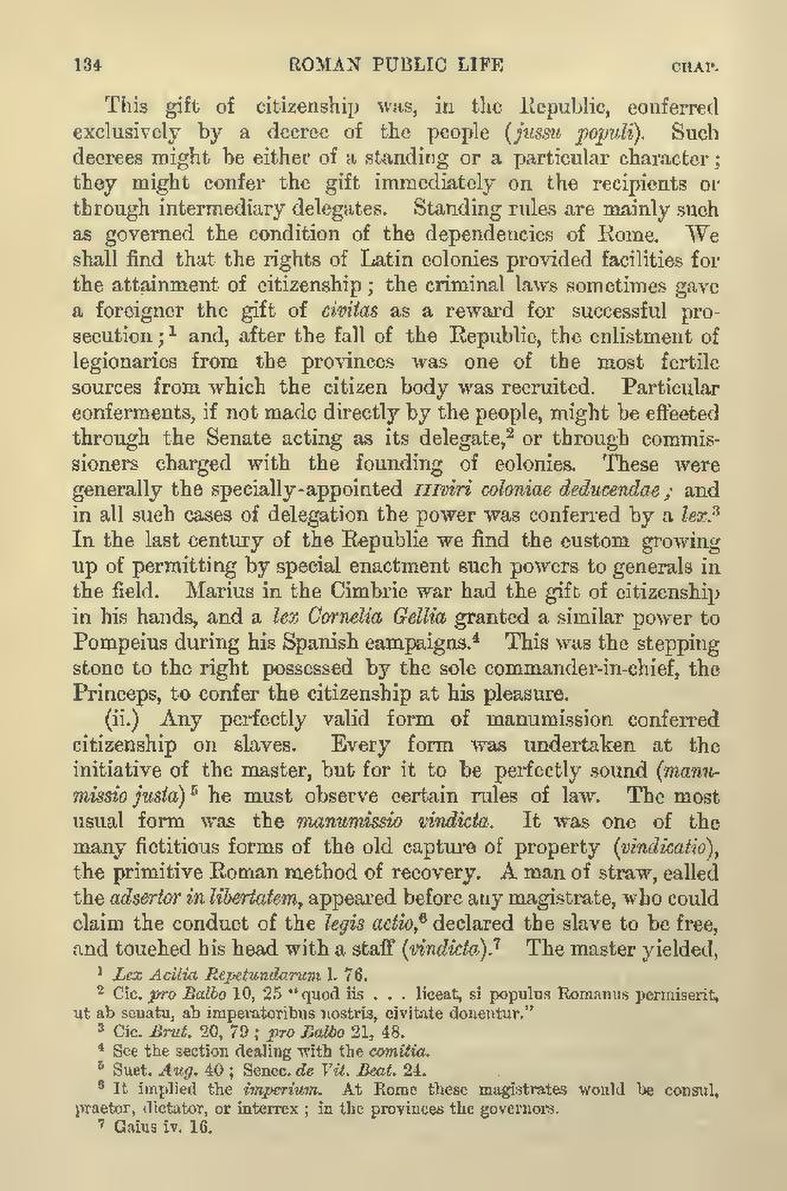This gift of citizenship was, in the Republic, conferred exclusively by a decree of the people (jussu populi). Such decrees might be either of a standing or a particular character; they might confer the gift immediately on the recipients or through intermediary delegates. Standing rules are mainly such as governed the condition of the dependencies of Rome. We shall find that the rights of Latin colonies provided facilities for the attainment of citizenship; the criminal laws sometimes gave a foreigner the gift of civitas as a reward for successful prosecution;[1] and, after the fall of the Republic, the enlistment of legionaries from the provinces was one of the most fertile sources from which the citizen body was recruited. Particular conferments, if not made directly by the people, might be effected through the Senate acting as its delegate,[2] or through commissioners charged with the founding of colonies. These were generally the specially-appointed IIIviri coloniae deducendae; and in all such cases of delegation the power was conferred by a lex.[3] In the last century of the Republic we find the custom growing up of permitting by special enactment such powers to generals in the field. Marius in the Cimbric war had the gift of citizenship in his hands, and a lex Cornelia Gellia granted a similar power to Pompeius during his Spanish campaigns.[4] This was the stepping stone to the right possessed by the sole commander-in-chief, the Princeps, to confer the citizenship at his pleasure.
(ii.) Any perfectly valid form of manumission conferred citizenship on slaves. Every form was undertaken at the initiative of the master, but for it to be perfectly sound (manumissio justa)[5] he must observe certain rules of law. The most usual form was the manumissio vindicta. It was one of the many fictitious forms of the old capture of property (vindicatio), the primitive Roman method of recovery. A man of straw, called the adsertor in libertatem, appeared before any magistrate, who could claim the conduct of the legis actio[6] declared the slave to be free, and touched his head with a staff (vindicta).[7] The master yielded,
- ↑ Lex Acilia Repetundarum 1. 76.
- ↑ Cic. pro Balbo 10, 25 "quod iis . . . liceat, si populus Romanus permiserit, ut ab senatu, ab imperatoribus nostris, civitate donentur."
- ↑ Cic. Brut. 20, 79; pro Balbo 21, 48.
- ↑ See the section dealing with the comitia.
- ↑ Suet. Aug. 40; Senec. de Vit. Beat. 24.
- ↑ It implied the imperium. At Rome these magistrates would be consul, praetor, dictator, or interrex; in the provinces the governors.
- ↑ Gaius iv. 16.
